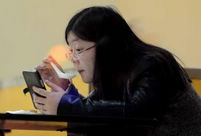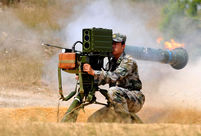 Li Na crashes Belinda Bencic in 2nd round at Australian Open
Li Na crashes Belinda Bencic in 2nd round at Australian Open
 Shocking moments when PLA's weapons open fire
Shocking moments when PLA's weapons open fire Famous Lanzhou beef noodles
Famous Lanzhou beef noodles Armed Police hold anti-terrorism drill in SE China's Xiamen
Armed Police hold anti-terrorism drill in SE China's Xiamen Harbin Int'l Ice and Snow Festival opens
Harbin Int'l Ice and Snow Festival opens 'Jin' named the word of the year by cross-strait netizens
'Jin' named the word of the year by cross-strait netizens Chinese scientific expedition goes to build new Antarctica station
Chinese scientific expedition goes to build new Antarctica station
 Chinese naval escort fleet conducts replenishment in Indian Ocean
Chinese naval escort fleet conducts replenishment in Indian Ocean 17th joint patrol of Mekong River to start
17th joint patrol of Mekong River to startThe English-language standards for Chinese college students should be raised, not lowered, in any national reform of English education, an expert said.
Citing international research, Cai Jigang, deputy director of the Foreign Language Research Institute of Fudan University in Shanghai, said on Jan 15 that a college student should have a vocabulary of 8,000 to 10,000 English words, and be able to read at least 200 words per minute to function in their academic or vocational lives after graduation.
"However, most college students now must master only about 4,500 words and read 70 to 100 words a minute in the College English Test Band 4."
It is a national English test that evaluates college students’ English proficiency.
"It means that the English ability of those students is hovering at quite a low level," he said.
Cai made the comments at a round-table discussion in Beijing organized by the Test of English for International Communication program under the Educational Testing Service. The round table exchanged opinions among college professors, students and English-test organizers on topics such as English education in college and students' language proficiency.
Cai's remarks were in response to the Beijing Municipal Commission of Education's draft reform plan for English tests in the college entrance exams for 2014. The plan, released late last year, would reduce the required English score from 150 to 100, and the vocabulary from 3,500 words to 3,080. The required vocabulary will decline further in the 2015 exams.
Cai said the new standards are far from adequate and will have an adverse effect on students' ability to study, work and communicate in English. Middle school students in Japan are required to master 5,900 English words, while in Russia, it is 9,000 words he added.
To change the situation, 24 universities in Shanghai jointly released a framework in April for teaching English as a Foreign Language at the tertiary level, raising the requirement for college students. Students must master 8,000 to 10,000 English words, read English academic literature, understand and communicate during English lectures, and write academic papers of 1,500 English words.
The framework is being tested, and it may take some time to see how it works, Cai added.
Zhao Huijie, a postgraduate student at Beijing University of Post and Telecommunications, said taking different kinds of English tests is also an effective way for her and many of her classmates to improve their English.
Zhao, who will graduate with a master's degree in electronics in March, said she took the TOEIC in 2013 and scored 965 out of 990, and she had made great progress in listening, speaking, reading and writing in preparation for the test.
"Thanks to my English ability, I got a good job recently," she said.
 In photos: Ten 'tuhao' devices in 2013
In photos: Ten 'tuhao' devices in 2013 College students saved from an ice hole by brave citizens
College students saved from an ice hole by brave citizens Gallery: Top 10 box office hits in 2013
Gallery: Top 10 box office hits in 2013 Beautiful churches around the world
Beautiful churches around the world Yang Mi, Hawick Lau hold wedding in Bali
Yang Mi, Hawick Lau hold wedding in Bali 'Phubbing' people seen everywhere
'Phubbing' people seen everywhere World's biggest snack shop in China
World's biggest snack shop in China Shocking moments when PLA's weapons open fire
Shocking moments when PLA's weapons open fire World's fastest train CRH380A assembled in E China
World's fastest train CRH380A assembled in E China Chinese naval escort taskforce repels 4 suspicious vessels
Chinese naval escort taskforce repels 4 suspicious vessels Should highways charge tolls on New Year's Eve?
Should highways charge tolls on New Year's Eve? Foreign banks optimistic about China's growth prospect
Foreign banks optimistic about China's growth prospect  Li Na crashes Belinda Bencic in 2nd round at Australian Open
Li Na crashes Belinda Bencic in 2nd round at Australian Open New top ten sceneries of Qiandao Lake
New top ten sceneries of Qiandao Lake World's weekly photos (1.6-1.12)
World's weekly photos (1.6-1.12)Day|Week|Month